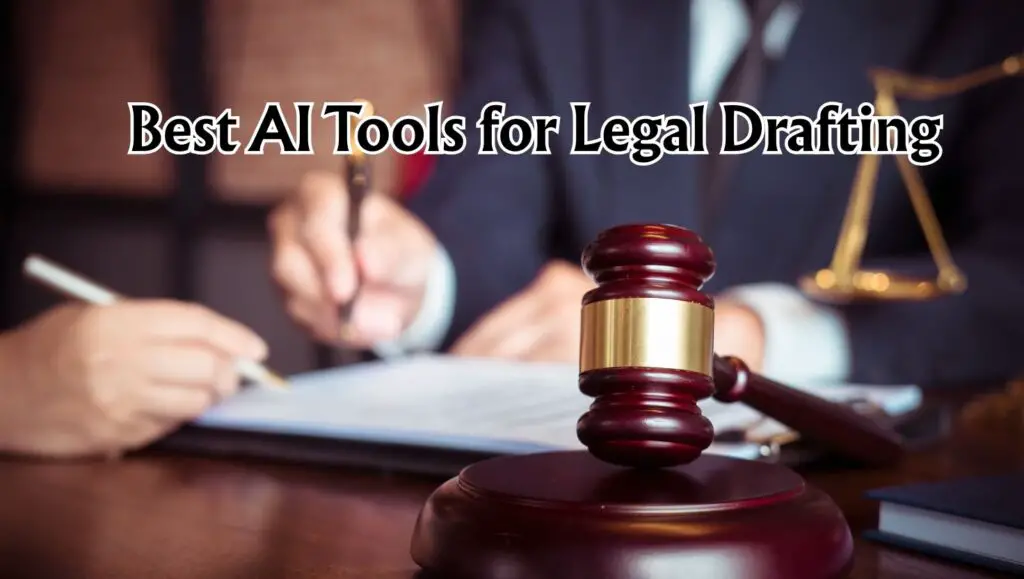Artificial Intelligence is transforming the way legal professionals create and manage documents. Drafting agreements, pleadings, and compliance documents has always been time-consuming, but AI tools now provide lawyers and firms with new ways to improve efficiency, accuracy, and client service. From generating contracts to reviewing thousands of pages of case material, AI has become an invaluable support system.
This guide explores how AI assists in legal drafting, the benefits it offers, the best tools available in 2025, important ethical considerations, and practical prompts to help professionals get the most from these technologies.
How AI Assists in the Creation of Legal Documents?
AI enhances legal drafting by automating repetitive parts of the process. Instead of manually researching precedents or copying language from old templates, lawyers can rely on AI to suggest clauses, identify risks, and align drafts with current legal standards. These tools scan large datasets in seconds and can generate initial drafts for review, saving hours of manual effort.
For example, an attorney preparing a non-disclosure agreement can instruct AI to draft the first version. The tool ensures that confidentiality, jurisdiction, and enforcement provisions are included. The lawyer then applies professional judgment to refine the draft. This combination of automation and expertise makes legal drafting faster and more reliable.
Can I use AI to draft legal documents?
Yes, AI can be used to create legal drafts, but these drafts should always be reviewed by a licensed professional. AI is not a replacement for legal expertise. Its role is to provide a strong starting point and to reduce time spent on repetitive drafting tasks.
Even individuals without formal legal training can use AI to create simple agreements such as leases, wills, or contracts. However, because laws and enforceability vary depending on jurisdiction and context, a final review by a professional is strongly advised to ensure compliance and accuracy.
Benefits of using AI in legal drafting
For practicing attorneys, the adoption of AI in drafting legal documents offers tangible advantages that directly enhance client representation and firm efficiency. The foremost benefit is time savings.
Tasks that once consumed billable hours, such as drafting routine pleadings, preparing form contracts, or reviewing boilerplate provisions, can now be completed in minutes. This allows lawyers to reallocate their time toward substantive legal strategy, negotiation, and client counseling.
AI also improves drafting precision. Legal documents often rely on precise language where even a minor inconsistency can have major consequences. AI tools can quickly identify contradictory clauses, missing terms, or noncompliance with statutory requirements. For transactional lawyers, this reduces exposure to contract disputes. For litigators, it ensures pleadings and motions are thorough and well-structured.
Consistency is another advantage. Firms managing large portfolios of contracts or litigation matters can use AI to standardize drafting across cases. This reduces variability and helps maintain the uniform quality of work product.
From a client-service perspective, AI enables firms to deliver faster turnaround times and more cost-effective services. This can be a competitive advantage in attracting and retaining clients who expect efficiency without sacrificing accuracy.
Ultimately, AI enhances the value lawyers bring to the attorney-client relationship by minimizing time spent on repetitive tasks and maximizing time spent on advocacy, strategy, and judgment-based decisions that AI cannot replicate.
11 Best Suitable and Easy-to-Use AI for Legal Drafting in 2025

Spellbook
Spellbook specializes in contract drafting and review. Integrated directly with Microsoft Word, it suggests clauses, flags missing sections, and highlights risk factors. This makes it ideal for professionals already working within Word.
Spellbook is a paid platform, with trial access available for new users. To get the best results, create a draft first and then let Spellbook analyze it for gaps or risks, ensuring that critical provisions are not overlooked.
CoCounsel
CoCounsel is designed as a comprehensive AI legal assistant. It supports research, contract review, and litigation tasks, making it useful for both transactional and trial practices.
This is a paid service tailored to law firms. Attorneys can maximize their benefits by using the research features before drafting, allowing the tool to gather relevant precedents and legal standards that inform stronger documents.
Harvey AI
Harvey AI is widely recognized for its use in corporate and compliance law. It is built to handle complex drafting tasks, including contract reviews across mergers and acquisitions. Harvey analyzes large datasets and ensures that all agreements align with the intended deal structure.
As a paid enterprise tool, Harvey works best for large-scale projects involving multiple contracts. Attorneys can upload related documents, and Harvey will align language, identify conflicts, and recommend standardized terms.
Paxton AI
Paxton AI provides accessible drafting assistance, making it suitable for both lawyers and non-lawyers. It generates contracts such as employment agreements, NDAs, and leases with natural language prompts.
Paxton offers a free version with basic templates, while the paid version unlocks more customization. Small firms and individuals benefit most by using Paxton for quick and clear first drafts that a legal professional can then review.
Briefpoint
Briefpoint is tailored for litigation. It creates pleadings, motions, and responses by extracting relevant facts and legal principles from case materials. Trial lawyers find it especially useful for repetitive tasks.
This is a paid platform. To get the best outcomes, attorneys should provide detailed case inputs, allowing the tool to generate professional pleadings that save significant time.
ChatGPT
ChatGPT is one of the most versatile AI platforms available. While not designed exclusively for legal use, it can generate contracts, letters, legal research summaries, and first drafts of pleadings.
ChatGPT has free and paid (Plus) versions, with the advanced model offering more reliable outputs. To use it effectively, provide structured prompts such as “Draft a service agreement for a consultant with clear termination and confidentiality clauses.” Refining outputs with follow-up prompts ensures tailored drafts.
Kira Systems
Kira Systems is best known for contract analysis and due diligence. While it does not generate drafts from scratch, it identifies important clauses and compares agreements across large datasets, making it valuable for corporate transactions.
Kira is a paid tool. Its best use is for large-scale reviews in mergers or portfolio management. Attorneys can use Kira’s insights to draft new agreements that reflect industry norms and best practices.
Lawgeex
Lawgeex specializes in automated contract review. It compares agreements against company policies and standard legal requirements, ensuring compliance and reducing negotiation risks.
Lawgeex is a paid service. It is particularly useful when reviewing third-party contracts, highlighting problematic clauses, and suggesting revisions. Drafting is strengthened by aligning with its compliance checks.
Gavel
Gavel focuses on workflow automation and document generation. It allows firms to create automated templates for pleadings, agreements, and other repetitive drafts.
Gavel is a paid service but offers significant efficiency gains for firms managing large volumes of similar documents. The best practice is to build standardized templates once and then allow Gavel to auto-populate case-specific information.
Claude AI
Claude AI is designed as a conversational system with an emphasis on safe and reliable outputs. It can generate contracts, briefs, and research memos with clarity and consistency.
Claude offers both free and paid versions. The tool is most effective for producing first drafts of complex documents or summarizing lengthy materials. Its ability to process large inputs makes it valuable for reviewing contracts with multiple attachments.
MyCase IQ
MyCase IQ integrates with the MyCase practice management system. It assists in drafting motions, contracts, and pleadings directly within the platform.
This is a paid feature. Attorneys achieve the best results by connecting MyCase IQ with case data, allowing the tool to draft documents pre-filled with client-specific details. This ensures consistency across files while saving time.
Ethics to Follow when using an AI in drafting legal documents

For attorneys, the use of AI in drafting is governed by the same professional obligations that apply to all aspects of practice. Lawyers must exercise independent professional judgment and cannot delegate ultimate responsibility for the content of legal documents to a machine. AI is a tool, not a substitute for legal counsel.
Confidentiality is paramount. Under the rules of professional conduct, lawyers must safeguard client information. Uploading sensitive data into unsecured AI platforms could compromise the attorney-client privilege. Attorneys should only use AI systems with clear data security measures and should avoid exposing confidential case facts in publicly trained systems.
Competence is another ethical requirement. Lawyers must have a reasonable understanding of the technology they use. This includes knowing the limitations of AI outputs, recognizing when results may be incomplete or biased, and ensuring that all AI-assisted drafts undergo attorney review before being shared with a client or court.
Transparency with clients may also be necessary in some contexts. Clients trust their lawyers to provide personal attention. If a significant portion of a document is AI-assisted, some jurisdictions may expect disclosure to maintain client trust and avoid any appearance of misrepresentation.
Bias and fairness are additional considerations. AI models are trained on existing data, which can sometimes reflect outdated or discriminatory language. Attorneys must remain vigilant in identifying and correcting any such bias to maintain ethical standards and uphold the integrity of their work.
Finally, accountability always rests with the lawyer. Even if AI provides the first draft, the attorney’s signature on a pleading, agreement, or opinion signifies that it has been reviewed and meets the professional and legal standards required by law.
Useful Prompts for Legal Drafting
Prompts help AI tools generate accurate and relevant drafts. Here are ten useful examples:
- Draft a non-disclosure agreement for a business sharing confidential data with a vendor.
- Create an employment contract with a probationary period and clear termination clauses.
- Generate a commercial lease agreement for an office space with a five-year term and renewal option.
- Draft a “last will and testament” that distributes assets among family members and appoints guardians for minors.
- Prepare a legal notice for non-payment under a service contract.
- Write a partnership agreement detailing contributions, profit sharing, and dispute resolution.
- Draft a memorandum of understanding for a joint venture between two companies.
- Create a privacy policy for an online retail website.
- Draft a power of attorney granting authority to manage and sell property.
- Generate a service agreement for a freelance professional with intellectual property ownership clauses.
By starting with clear prompts, lawyers can guide AI toward producing strong first drafts that are later refined with professional oversight.
Note: The above prompts are very general and common, but to add value to your drafting, you will need to create your own prompts according to the situataion and the draft that you want to generate!
Conclusion
AI has become an essential ally in legal drafting, offering speed, accuracy, and scalability. Tools such as Spellbook, Harvey AI, and ChatGPT support professionals in producing drafts faster and with fewer errors.
The role of AI is not to replace legal expertise but to enhance it, freeing up valuable time for client-focused work.
With ethical use and precise prompts, legal professionals can make AI a cornerstone of their drafting process in 2025 and beyond.